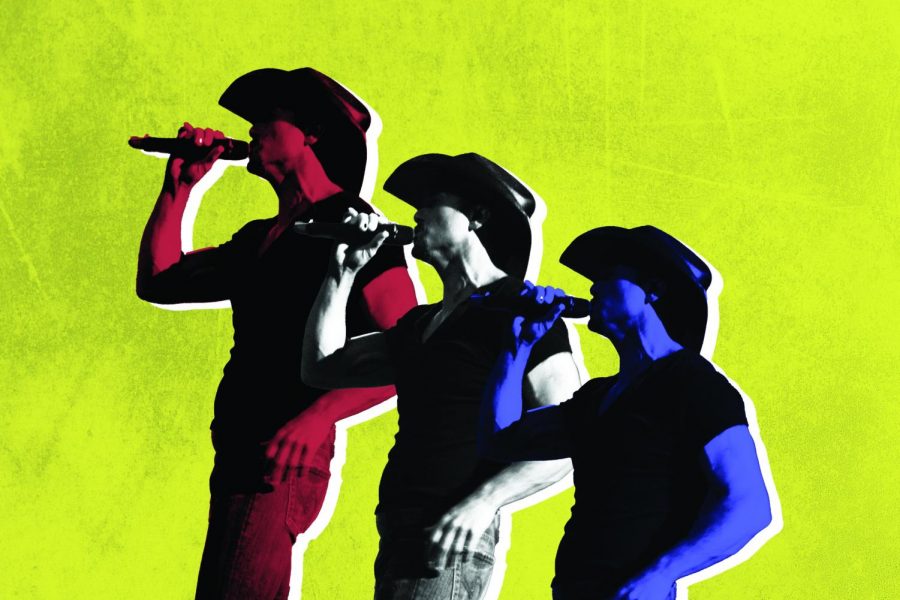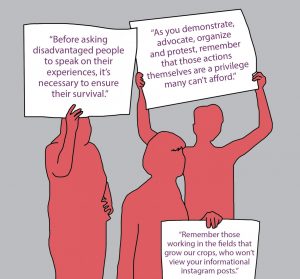Mocking the South Does Not Make You a Better Liberal
Stop blaming the South for problems that plague the whole country
April 27, 2021
 Personally, I think there’s some fantastic country music out there. “Toes” by Zac Brown Band? A banger. “Live Like You Were Dying” by Tim McGraw? Beautiful.
Personally, I think there’s some fantastic country music out there. “Toes” by Zac Brown Band? A banger. “Live Like You Were Dying” by Tim McGraw? Beautiful.
You do not have to agree with me. However, you also do not have to call country music trashy. When asked what they listen to, you hear a lot of people say they are willing to listen to anything except country music. While I understand that country music might not be palatable, I also think that people tend to put it down because country music is strongly associated with the South.
The condescending attitude toward Southern culture is not just about personal preference. Silly stereotypes may seem negligible on the surface level but overarching assumptions about the South can be quite harmful. When Northerners look down on Southerners simply for being Southerners, they are not only being pretentious, but also classist and elitist.
Adopting a snobbish attitude toward the South is unproductive and invalidates the ongoing racism that permeates every region of the country.
The idea that Southern states are more racist than Northern states is a haunting narrative of a country in denial. America has never been good at confronting its ugly history, much less accepting the work it still has to do. Adopting a snobbish attitude toward the South is unproductive and invalidates the ongoing racism that permeates every region of the country.
Are All Southerners Conservative?
The most common assumption is that being from the South makes you conservative, which is simply false. In the 2020 election, Georgia turned blue and Texas was closer than ever to turning blue. Consider also that voter suppression happens more rampantly in the South compared to Northern states. We are only four months into 2021 and Republicans have already pushed for over 165 bills that suppress voters in Southern states, including Alabama, Kentucky and Mississippi. All of these bills target Black, Indigenous and people of color (BIPOC) communities, so the population most likely to vote blue is not accurately represented.
In fact, in terms of diversity, the South has a lot of states with a higher-than-average percentage of Black people living there. In 2019, most of the states with a higher-than-average percentage of the Black population were Southern states. This year, Houston tops the list of the most diverse cities in the United States. Instead of focusing on the conservative voices, perhaps question why BIPOC voices are not being heard, especially in those regions.
Southern Racism and the Civil War
This begs the question, why do people pretend racism is a predominantly Southern thing? What does it say about your own progressiveness when you disproportionately attribute this country’s racism to the South?
The South may be associated with the Confederacy, but using that as the sole reason to portray the South as more racist is an oversimplification. Just because slavery was more highly concentrated in the South before the Civil War, due to its agriculture-based economy, does not make the North guiltless. Jim Crow laws began in the North before the Civil War. While New Yorkers may not have had slaves the way Southerners did, the 19th-century New York City economy was heavily dependent on slave labor.
When people assume everyone from the South falls under these stereotypes, they are less interested in helping Americans move past prejudices and more interested in distancing themselves from any similar criticism they might receive.
Dividing this country’s racial issues between the South and the North pushes the false narrative that America’s racism ended when the North won the Civil War. This then does not allow us to address the very real, incredibly insidious ways in which BIPOC are being harmed in every state, no matter the region.
The Implications of ‘Hillbilly’ and ‘Redneck’
There is also an ongoing narrative that southerners are less sophisticated, less educated and just overall less modernized. The terms “redneck” and “hillbilly” are also littered with negative connotations. Calling someone a hillbilly is essentially calling them poor and unsophisticated. Similarly, “redneck” has been used to stereotype Southerners as poor and holding discriminatory views. I am not denying that there are plenty of Southerners who have perspectives that are full of prejudices. I do believe, however, that when people assume everyone from the South falls under these stereotypes, they are less interested in helping Americans move past prejudices and more interested in distancing themselves from any similar criticism they might receive for being anything but liberal.
The term “redneck” also comes from the red burns farmers would get on their skin from working in the sun. Along with the rhetoric that Southerners are lazy, there is also the idea that time moves slower in the South. Early industrialization did begin in the North, which still impacts the difference in industry distribution between the South and the North today. But looking down on regions with more farmland, using the number of different industries to measure the prosperity of a region, and viewing rural lifestyles as lazy is a very capitalistic and elitist mindset.
Country Music or Southern Politics?
This is a lot to conclude from just some snarky comments toward country music. I am not saying that everyone who dislikes country music is elitist with their progressiveness. In fact, not everyone who dislikes country music has progressive views at all.
This isn’t really about music taste. I’m just asking you to consider what you associate with the South and whether or not those stereotypes are playing into the anti-racist views that you take a stance against. If your liberal views involve looking down on an entire half of the country, perhaps your progressiveness is not so inclusive after all.















Sick of it • Jul 26, 2023 at 7:52 am
You forgot about the part how the south sucks up taxes from blue states, yet constantly bitches and complains about “communists “and liberals
Brian • Jun 4, 2023 at 2:16 pm
I will say that why northerners call us stupid in the south is beyond me. We have lower taxes, cleaner streets, good schools, friendlier people, strong laws. People are moving out of the north in droves becuse they can’t stand taxation without representation. But somehow, we’re stupid in the south. Let that sink in…
Misty • Apr 11, 2023 at 10:05 pm
I’m a leftist / antiracist southerner who organizes for justice and liberation, and it’s basically a cartoon to hear northerners and westerners commenting without knowing or acknowledging. It’s very old. Your article is super on point, and I’m so glad to come across it. Thank you so much for writing this and the work you do!
Gianna Fine • Jan 30, 2022 at 12:44 pm
As someone who was born in the North, raised in the South, and is moving to New York City, I highly appreciated this article. I searched for something about the topic for a bit and finally found it. Thank you!
Jennifer • Sep 5, 2021 at 8:52 am
Well said. Some of my very liberal country music hating friends should read this article.